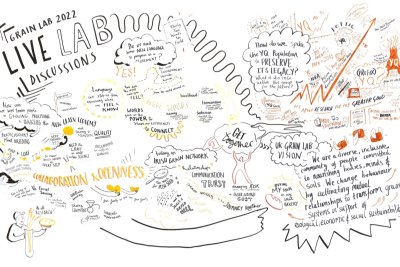Sustain • Coronavirus Food Alert • Responding to food vulnerability
How can Local Authorities address food vulnerability during Covid-19?
Local authority briefing, May 2020
The Covid-19 outbreak has exacerbated levels of household food insecurity across the UK. The economic downturn is likely to continue, as are social distancing measures, which in turn affect job security, incomes, the welfare system, and the demand for and ability to deliver emergency food aid provision, both in crisis and the longer term. Local authorities have been responding at impressive scale and pace, for instance redeploying staff, investing in food services and emergency food aid, and establishing food distribution systems alongside the mandatory coordination hubs and helplines run with Local Resilience Forums.
During Covid-19, Sustain has been involved in strategic coordination groups run by national Government and local authorities, and has been publishing guidance, as well as running webinars and information services to help inform and stimulate the emergency food response. Find out more on Sustain’s Coronavirus Food Alert pages.
Contents
This guidance focuses on local authorities’ emergency response to mitigate the worst and most immediate aspects of food vulnerability during Covid-19. In it we cover:
- General ways of working that have enabled local authorities to respond well;
- Action to improve access to food for the following groups:
- Infants and very young children
- School age children
- Older and disabled people
- People in financial hardship
- People with ‘No Recourse to Public Funds’ (NRPF)
Local authorities also have a vital role to play in ensuring longer term resilience by supporting good food traders, markets, community gardens and the local voluntary and community sector. Sustain's persepctive on this is forthcoming.
Scale of need
Data from the Food Foundation suggests that around 5 million adults and 1.5 million children have experienced difficulty accessing food during Covid-19 – roughly half due to financial hardship; and half due to problems of accessing food due to isolation, old age, illness, disabilities and other physical barriers; with geographical variation. The biggest food bank network Trussell Trust reports an 81% increase in referral of people experiencing destitution and hunger since the same period last year, with 122% more children. Food banks in the Independent Food Aid Network (IFAN) report an average 59% increase in need from February to March 2020.
1.8 million people have signed on for Universal Credit due to job losses, with pre-Covid patterns suggesting that many will need to resort to food aid in the near future due to low income. According to the Resolution Foundation, one in eight (13%) of current workers think it is likely they will lose their job in the next three months; more than one in seven (15%) believe they will be furloughed; and nearly a quarter (23%) think their hours will be reduced. The same data shows that job and hours losses are much more common among lower-earning employees. There seems little prospect that mass household food insecurity will abate any time soon, and may well grow substantially.
Ways of working
In the face of mounting household food insecurity, local authorities, Local Resilience Forums and the voluntary and community sector (VCS) are working hard to meet increased need. They have established centralised coordination hubs and in some cases food distribution systems. In London, the newly formed London Food Alliance, coordinated by FareShare, is helping VCS groups and local authorities access surplus and donated food, and food bought with government grants.
Specific policy measures are vital aspects of the local response – for instance through expansion of local welfare assistance schemes and crisis grants. There are also important components of a good local response that are harder to quantify. Broadly, the local authorities that are doing well:
- Have clarity around roles and responsibilities – where joint work is happening, lines of communication between different actors are open, and which person or organisation has responsibility for which area of work is clear to other parties. For this to work well, usually the local council is taking a leadership role, but with an understanding of the important role of the local voluntary and community sector (VCS), particularly in understanding the needs of, and making contact with, harder to reach vulnerable people.
- Are flexible around areas of responsibility. Alongside clarity on who is responsible for a given area of work, there is a willingness to take on additional work where this is needed, and an openness to shared ownership of work-streams.
- Are taking a longer-term view and supporting local food markets, neighbourhood shops and good food traders to stay open, especially where these provide nutritious and affordable food locally, accessible and appropriate to diverse communities.
- Have clear and effective external communication. This includes an accessible and well promoted helpline, alongside clear instructions about available support and how to access it on their website, social media, leaflets, and via VCS partners. Ideally this also takes account of barriers to access for example by providing guidance on multiple languages and is accessible to disabled people, older people, and those with limited digital access.
- Have an effective triage system that directs callers to the right support. This integrates both financial and food-based solutions, and explicitly avoids directing more people to charitable food aid.
The importance of a good triage system: Good coordination and referrals to appropriate support rest on a good triage system. It helps ensure people calling the helplines gets the support they need and is a repository for local knowledge and coordination. Sustain has developed a document setting out a strategic approach to Covid-19 food and vulnerability setting out categories, triage and a suite of options for response. This draws on models being applied by Local Resilience Forum, local authority, voluntary and community sector (VCS) partnerships across the country.
Food partnerships, food poverty alliances and food poverty action plans
In our experience, local authorities that are coping well are broadly also:
- KEY ACTION Tapping in to existing local assets such as food partnerships and food poverty alliances, and are working with and supporting pre-existing voluntary groups as well as the newly formed Covid-19 mutual aid groups. They are not trying to start from scratch but instead are taking a collaborative approach which that utilises local knowledge, connections, and resources. This is of course easier in areas where the voluntary and community sector is strong and/or where food partnerships or food poverty alliances already exist.
- Building on or being guided by relevant actions and activities planned out within existing food poverty action plans or similar.
- Collaborating well with existing VCS groups and starting to form the basis for a future food poverty alliance, where these do not already exist.
Local authority support for specific groups
For each group, we set out two to three recommended actions that local authorities should take.
Infants and early years
- Ensure local infant feeding support networks are sustained and supported during lockdown and for those self-isolating, alongside clear referral pathways to relevant health workers for families that request infant formula.
Healthy Start voucher scheme
Healthy Start is the UK’s food welfare scheme for pregnant women and young children in low-income families, who are amongst the groups most at risk of experiencing food poverty. The vouchers are an important means-tested scheme providing a basic nutritional safety net.
- KEY ACTION Promotion of the voucher scheme and vitamins, including informing families that application forms for vouchers no longer require a health professional’s signature
- Paper application forms are proactively sent to families who are likely to be eligible, for example included in food aid deliveries or shared with mutual aid groups
- Families are advised that the paper application form is available to print online here or can be requested by phone via the Healthy Start helpline on 0345 607 6823.
School age children
School holiday provision
- KEY ACTION Extend any and all existing holiday food provision to cover all of the entire school closure period (adapting as needed to ensure safety)
- Invite third sector partners to set up food provision in the area if not already operating
- Proactively plan for the increased need that will be seen during the summer holidays this year by establishing additional provision for this period.
Free school meals
- KEY ACTION Support schools to provide a mixed model of continued catering and/or vouchers, depending on the needs of parents and children at each specific school
- Support schools to provide a cash card system, thus enabling parents and caregivers to choose the retailer that they buy food from, and circumventing voucher distribution systems which have been problematic for some councils, schools and parents. A cash card system has successfully been implemented in Enfield and South Lanarkshire
- Compile food packs with £15 worth of food at wholesale rather than retail price, which can be distributed to families weekly. This system has successfully been implemented in the Royal Borough of Greenwich which enabled families to access more food weekly
- Share information on the extension of eligibility for free school meals for some families with the immigration condition ‘No Recourse to Public Funds’ with council staff, school staff, and parents/carers. Where possible extend support to all children in need of support due to the extreme financial vulnerability caused by the No Recourse to Public Fund condition.
Older and disabled people
- Ensure supermarkets are giving priority delivery slots for older and disabled people not able to access volunteer shoppers
- Ensure all clinically shielded people who wish to receive a government and/or local food box are getting one
- Ensure food boxes received have adequate nutrition: Some local authorities are creating their own local food boxes that replace or supplement the government scheme, to enable healthier options with more fresh food, more choice, and sometimes procuring from local food businesses to help support local jobs
- Offer food boxes to people at particular risk who are not covered by the government food box scheme. These schemes can integrate paid-for, subsidised or free boxes, depending on needs and circumstances
- Ensure local helplines can signpost callers to other appropriate services, such as social services, volunteer shoppers and befriending.
Meals on wheels
- KEY ACTION Extend any existing meals on wheels service (in house or by allocating funding, other support and/or additional staff time)
- Support new community provision and established services, in particular with access to referrals via adult social care and hospital discharge teams
- Support new community provision by providing funding, premises or other support
- Support school food caterers or other caterers to begin providing meals on wheels services Please see our report on how this can be done and the support that can be given
- Waive parking fines for any and all providers, to enable them to make deliveries and spend time helping isolated people, without incurring expensive parking fines.
People in financial hardship
We recognise that for many of the recommended actions below, Government funding has not been made available and there are no statutory provisions. We are aware that national Government and social security also a key role to play and we continue to advocate that Government should conduct a thorough needs and impact assessment and allocate funding accordingly. Whilst we are aware that meeting each of the recommended actions is a challenge, each is being carried out by a local authority; section demonstrates what is possible and what we have been inspired by.
Food relief
- KEY ACTION Make funds available for new or existing VCS groups that are providing meals, tailored food packages, or other hardship support to people in the community
- KEY ACTION Establish at least one food distribution hub to help coordinate food supplie
- KEY ACTION Establish several pathways of food support tailored to differing needs. These will include emergency food aid packages that can be accessed within one day of calling the helpline, as well as parcels for persons with no cooking facilities, older adults, and families. This should include pathways for people who can pay and can’t pay. Please see our case study for ideas on how this can be done well
- Ensure clear, accessible signposting for services and schemes is available on the home page of the council website
- Establish a helpline that is well advertised and ensure call handlers are well trained on appropriate triaging and signposting (see note on the centrality of the triage system, above)
- Integrate a public health perspective into the emergency food response, e.g. by including health advice leaflets and vitamin supplements in food aid packages, and planning food packages so that they will provide a nutritionally balanced diet for the whole week. This should be done in consultation with council public health and teams and nutritionists where possible.
Financial support and relief
- KEY ACTION Expand eligibility for any of the financial support or relief schemes mentioned below, for example by:
- expanding the disaster relief criteria (usually encompassing floods, fires and/or contamination events) to include any household with a member that has suspected or contracted Covid-19 Coronavirus and needs to self-isolate
- expanding eligibility criteria to include persons with NRPF, students or others previously excluded
- Expand capacity in benefits advice services
- Where support schemes are ring-fenced for food bank use or white goods, offer cash grants instead. This is particularly important in areas with a limited number of food banks, or where food banks have closed or been overwhelmed by the increase in referrals
- Establish or expand a support scheme that assist residents with housing costs, available for those in immediate and severe financial hardship who are unable to make rental payments (this includes schemes such as Discretionary Housing Payment)
- Establish or expand an emergency financial hardship fund which provides financial support to anyone over the age of 16 living in the area who is in financial crisis (this includes schemes such as Crisis Funds, Emergency Funds, Exceptional Hardship Funds, Community Support Awards and Local Welfare Assistance Schemes)
- Suspend all debt-related court action until lockdown is fully lifted, at a minimum
- Suspend all evictions for council tenants
Council Tax Support
- KEY ACTION Set the minimum payment as low as possible, with 100% reductions wherever possible
- Ensure clear, accessible signposting for the scheme is available on the home page of the council website
Physical access to affordable and healthy food
- KEY ACTION Help markets stay open, especially culturally specific and/or affordable fruit and vegetable markets
- Host a regularly updated map on the council website that lists markets, food aid providers, and retailers accepting Healthy Start vouchers and Free School Meal vouchers, for example Hackney Council’s map or Oxford City Council’s Directory
- Provide targeted funding to organisations delivering meals for those who are shielding, cocooning or self-isolating
Continue commitments as an accredited Living Wage employer, including paying the real Living Wage for furloughed staff
- KEY ACTION Maintain any and all existing commitments, including for furloughed staff. Where staff are on furlough and 80% of their wage does not constitute the real Living Wage London Living Wage, top up the government scheme to 100%.
We’re inspired by...
Below, we share some of the stand-out examples that helped to inspire this briefing. If you know of other examples we should be promoting, please let us know.
- Brighton & Hove’s local response to Covid-19
- Enfield
- Greenwich
- Free School Meal caterers who are providing meals on wheels
Find out how places across the UK are responding to Covid-19: https://www.sustainablefoodplaces.org/coronavirus/
Coronavirus Food Alert: Sustain's work on food resilience in the COVID-19 coronavirus pandemic.We are helping secure food for vulnerable people and supporting local emergency responses.


